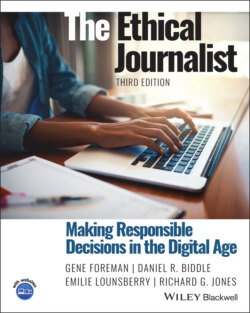Читать книгу The Ethical Journalist - Gene Foreman - Страница 37
Ethical Decision: Complex Process
ОглавлениеThe person who makes a decision in a given situation is called the moral agent. To be an effective moral agent, you can’t decide on a whim. Clear thinking is needed. Ultimately, your decision must be one that you can defend as having been rationally chosen by a caring individual. Josephson described the complexity of the process:
Most decisions have to be made in the context of economic, professional, and social pressures which can sometimes challenge our ethical goals and conceal or confuse the moral issues. In addition, making ethical choices is complex because, in many situations, there are a multitude of competing interests and values. Other times, crucial facts are unknown or ambiguous. Since many actions are likely to benefit some people at the expense of others, the decision maker must prioritize competing moral claims and must be proficient at predicting the likely consequences of various choices. 19
With practice, you will be more confident and consistent in your decision‐making.
This does not mean that you will not make mistakes. Everyone does.
“We need to acknowledge the mistakes, figure out how and why mistakes are made, and then try to do better,” ethics scholars Deni Elliott and Paul Martin Lester have written. In their view, professionals who take ethics seriously will “stay conscious of the power that they have and the responsibility that they have to use that power judiciously.” They will treat people fairly, with respect and compassion; they will keep an open mind to alternatives. 20
Elliott and Lester suggested a final check. If you think you have made your decision in a rational way, would you be willing to allow your decision process to be published on the front page or run in the first news segment on television? 21 If you wince at that prospect, you ought to think again.
